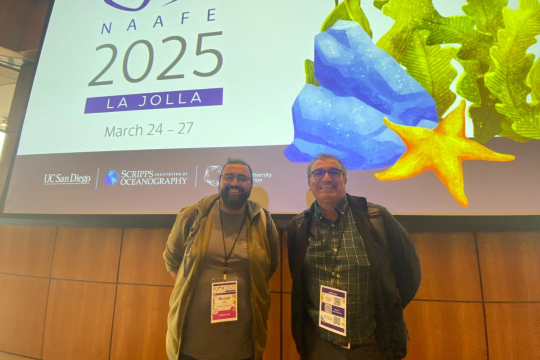NENRE EfD-Chile research fellows Manuel Estay and Carlos Chávez addressed the efficiency of current fisheries policies and the impact of climate change on the industry in their participation in the NAAFE Forum 2025 at the Scripps Institution of Oceanography at the University of California, San Diego, USA.
The North American Association of Fisheries Economists (NAAFE), an international collective of fisheries economics professionals from industry, government, and academia, connects North American experts. The organization also encourages dialogue between economists and others interested in fisheries and aquaculture and strives to advance the science and practical uses of fisheries and aquaculture economics, in part through its biannual forum.
Current policies were evaluated
“The event featured topics and papers that are at the forefront of the field, so I believe they reflect current issues under review," commented Manuel Estay.
The most discussed topics were causal analysis methodologies for evaluation of fisheries and aquaculture, the impact of climate change and oceanographic conditions, management/administration, distributional and social aspects, and international trade in fisheries and aquaculture.
The impact of climate change on fisheries and aquaculture played a central role at the NAAFE Forum 2025. Two full parallel sessions included papers on this topic (Responses to Climate and Ocean Conditions and Climate Impacts on Fisheries and Aquaculture).
Manuel Estay presented his work, An Empirical Evaluation of Production Quotas in a Strategic Location and Entry Setting. This research evaluates the economic efficiency of the current zoning rules and production standards for salmon aquaculture in Chile, defined as their ability to maximize the total welfare derived from the industry.
International perspectives were addressed
Carlos Chávez participated as a member of the International Institute of Fisheries Economics and Trade (IIFET) Executive Committee. He presented his ongoing research, Linking Climate Conditions with Fish Farming Performance: The Case of Salmon Production in Northwestern Patagonia, and Exclusion and Common Pool Resource Management: Experimental Evidence, with preliminary results.
"Although NAAFE has a territorial focus, it does not limit the contributions from other latitudes, as our participation shows. And there was room for debate regarding the differences in addressing climate change between countries," said Manuel Estay.
Featured research
Manuel Estay
-
An Empirical Evaluation of Production Quotas in a Strategic Location and Entry Setting. This unpublished study is part of an ANID-Fondecyt project (a Chilean funding agency that provides grants for research projects across various scientific and technological disciplines) titled Efficient Regulatory Options for Industries with Spatially Differentiated Pollution, Endogenous Location, and an Endogenous Number of Firms: An Empirical Study of Regulatory Alternatives for the Chilean Salmon Aquaculture.
Carlos Chávez
-
Linking Climate Conditions with Fish Farming Performance: The Case of Salmon Production in Northwestern Patagonia. This work is part of a larger project studying the impact of climate change and atmospheric variability on Chilean aquaculture from a socio-economic perspective. Presented to numerous academics, the team is exploring future possibilities for policy impact and is currently preparing the work for submission to a peer-reviewed journal.
-
Exclusion and Common Pool Resource Management: Experimental Evidence. This research is part of a Fondecyt Regular project (a Chilean government-funded program supporting individual research projects in science and technology) in collaboration with researchers Jim Murphy (University of Alaska) and John Strandlund (University of Massachusetts).
By Belén Pulgar.
